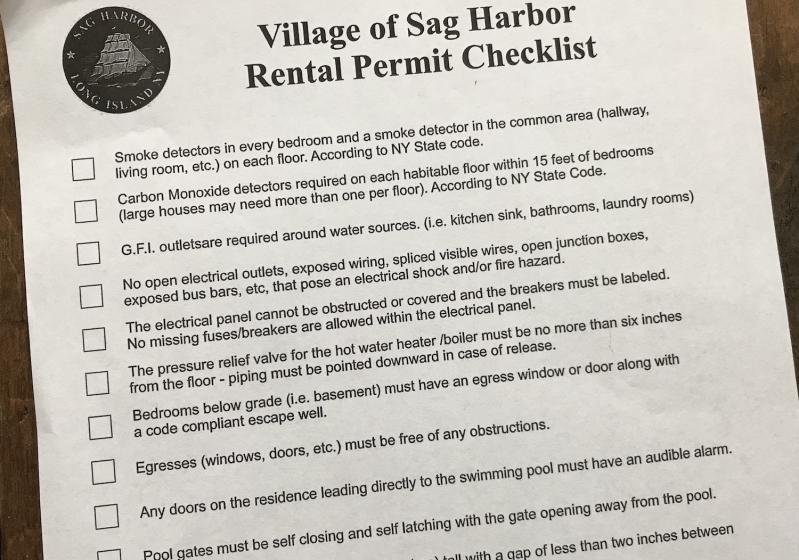After months of discussion prompted by a fatal fire in Noyac last summer, the Sag Harbor Village Board has amended its seasonal-use dwelling-unit law, resolving Tuesday night to require the addition of a rental registry permit. The intent of the new law, which takes effect on Jan. 1, is to ensure the safety of rented properties, in accordance with New York State Code.
Any homeowner seeking to rent for more than two weeks must now apply to the Village Building Department for a permit. The application includes basic information such as the homeowner’s name, the property’s location, and a copy of the lease. What is important, and in direct reaction to the Noyac fire, the law now requires that someone — the homeowner, an architect, an engineer, or a home inspector — sign off on a rental-property inspection checklist.
The checklist includes 12 items. For example, smoke detectors are required in every bedroom and in the common area of each floor, and carbon monoxide detectors must be located on each habitable floor within 15 feet of bedrooms. Rules regarding electrical outlets, egress, and pool areas are also outlined.
Several members of the public spoke up at the meeting, though less about the law and more about short-term rentals — an issue that Sag Harbor, and the East End in general, has had difficulty addressing. It is already against village law to rent for less than two weeks, but the residents told the board the law is widely ignored.
“Would Sag Harbor notify Airbnb or Vrbo that this will be a new law in effect, and they have to abide by it, for that 14-day residency? I mean, you need to cut off the head of the snake, and it’s with these two organizations,” said Richard O’Brien, who lives in the Harbor Close Condominiums.
“Those entities require homeowners to abide by local codes,” said Liz Vail, the village attorney. “We have no control over those sites at all.”
“If you have a house on your block and they’re renting for less than two weeks, it’s up to a neighbor to notify the village?” asked Kate Plumb.
“You always have that opportunity,” said Ed Haye, a trustee. “But that’s not this law. This is one step in the process.” The new permit requirement, he explained, gives the village a tool to understand who is renting and who the renters are. Ultimately, Mr. Haye said, it may help with better enforcement of the short-term rental law.
“We’re going to learn from this,” said Jeanne Kane, another trustee.
The legislation passed with unanimous support.
The board passed one other law, this one amending the hours of permitted construction, with a focus on noise. The new law prohibits heavy construction on Saturdays. Previously, construction was allowed that day between 9 a.m. and 5 p.m. If a resident had an interior issue — a plumbing problem, for example — that would be permitted.
To make up for the lost weekend time, the board extended construction activity from Monday to Friday for one hour, until 7 p.m.
“They work to the end of the day anyway,” said Ms. Kane.
Anthony Vermandois, a local architect, wondered about enforcement. Ms. Vail said police were authorized to stop activity at job sites if code enforcement personnel were unavailable.
“The hope is that some people self-police, and there will be exceptions, and they’ll have to be enforced, and we’ll have to work on that,” said Mr. Haye.
Two other public hearings, one about tree preservation and the other about the height of driveway gates, were held open until next month’s meeting, when legislation is expected to be passed.




